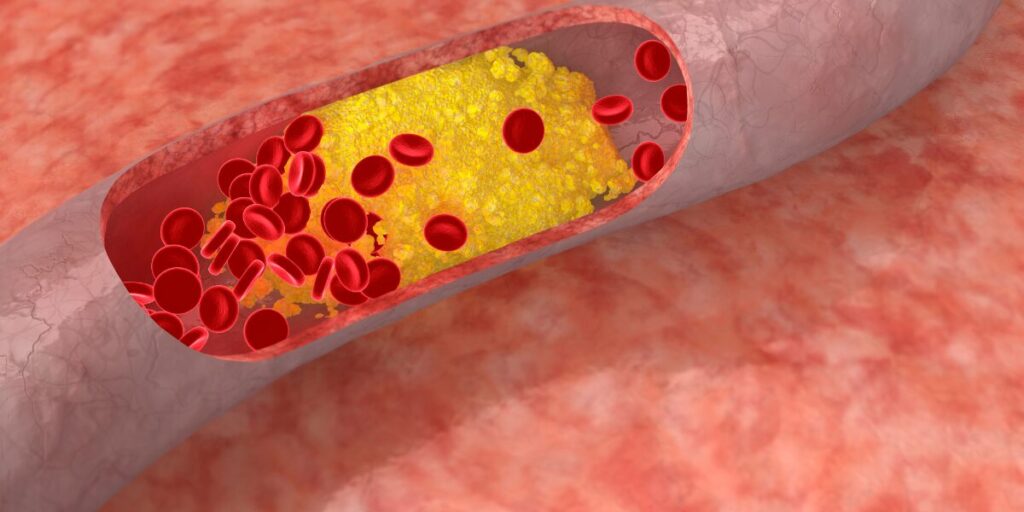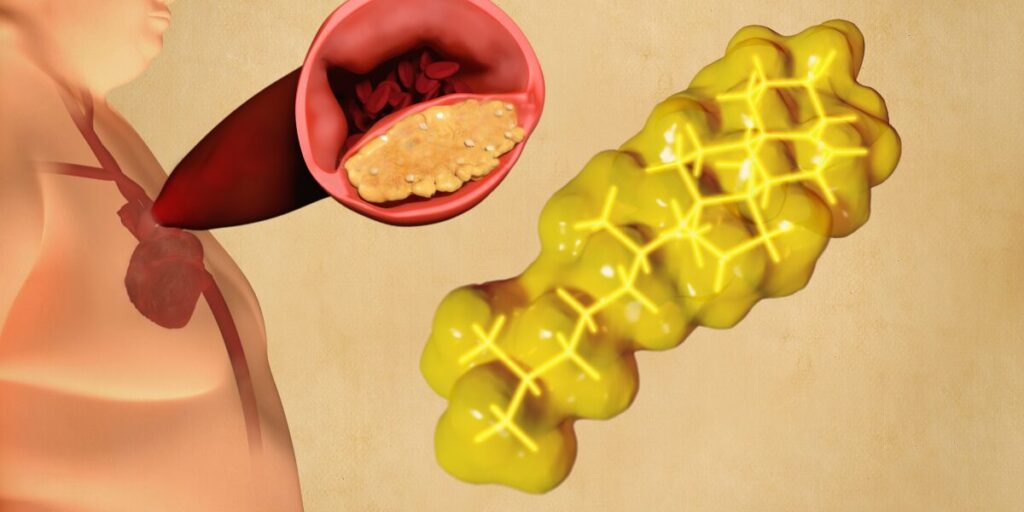High cholesterol is a common health issue that affects the body in many ways. It’s important to understand how can high cholesterol cause headaches are connected to our health.
Previous research show that high cholesterol can cause headaches because it affects blood flow and heart health. High cholesterol can make blood vessels narrow.
This reduces blood flow to the brain, which might cause headaches. So, can high cholesterol really cause headaches, and what’s behind this connection?
The connection between high cholesterol and headaches is complicated. It’s important to understand this topic better.
By learning how high cholesterol affects the body and how it may be linked to headaches, we can see why keeping cholesterol levels under control is important for our health.

Effects of High Cholesterol in the Body
High cholesterol is a common health issue that affects the body in many ways. When we ask if can high cholesterol cause headaches, we need to know the basics. High cholesterol can harm our health in several areas.
To understand how high cholesterol affects us, let’s look at the main points. Cholesterol is a fat in our blood that’s important for our health. There are two main types of Cholesterol are : LDL (Low-Density Lipoprotein) and HDL (High-Density Lipoprotein). LDL is a bad cholesterol whereas the HDL is a Good Cholesterol.
What is Cholesterol?
Cholesterol is a substance that is made in the liver and is found in some foods. It helps in making vitamin D and hormones.
Different Types of Cholesterol
There are two types of cholesterol are: LDL (Low Density Lipoprotein) It is a bad cholesterol which blocks the arteries. HDL (High Density Lipoprotein) It is a good Cholesterol because its remove other types of good cholesterol.

How Cholesterol Affects Blood Flow
Too much LDL cholesterol can cause plaque to build up in arteries, leading to atherosclerosis. This can block blood flow, raising the risk of heart disease and stroke. It can also cause headaches because the brain doesn’t get enough oxygen and nutrients.
In summary, knowing about high cholesterol and its effects is key to understanding its link to headaches. By learning about the different types of cholesterol and how they affect blood flow, we can see how high cholesterol impacts our health.
Can High Cholesterol Cause Headaches? The Direct Connection
Research shows a link between high cholesterol and headaches. When we think about can high cholesterol cause headaches, we need to know why.
High cholesterol can cause plaque in blood vessels, which reduces blood flow to the brain. This can lead to high cholesterol headaches.
High cholesterol affects blood vessels. As cholesterol builds up, blood vessels narrow. This reduces blood flow to the brain, causing headaches. Knowing this helps manage high cholesterol headaches and prevent more problems.
- Reduced blood flow to the brain
- Inflammation of blood vessels
- Increased risk of blood clots
These factors cause headaches in people with high cholesterol. By changing our lifestyle and getting medical help, we can lower our risk of high cholesterol headaches.
It’s important to see the Connection between high cholesterol and headaches. This helps us manage cholesterol and avoid headaches.
By understanding can high cholesterol cause headaches and high cholesterol headaches, we can live healthier and avoid complications.
If you are Interested to read another blog about How is Malaria Transmitted From Mosquitoes to Humans and Its Symptoms
The connection Between High Cholesterol and Blood Pressure
High cholesterol and blood pressure are closely linked and can be dangerous if not treated. People with high cholesterol often see their blood pressure go up and down.
This can cause headaches and other heart problems. So, can high cholesterol lead to dizziness, and how do these two health issues affect us?
Research shows that atherosclerosis, or plaque buildup in arteries, is key in high blood pressure. As arteries narrow, the heart works harder, raising blood pressure. This can lead to headaches and dizziness among other symptoms.

Warning Signs to Watch For
- High blood pressure readings
- Headaches and migraines
- Dizziness and lightheadedness
- Chest pain and shortness of breath
It’s important to watch for these signs and take action to manage cholesterol and blood pressure. Knowing how these conditions are connected helps us take charge of our health.
Regular health checks, a balanced diet, and exercise can help lower cholesterol and blood pressure. This reduces the risk of headaches and other symptoms.
The Role of Atherosclerosis
Atherosclerosis is a condition in which plaque builds up in the walls of arteries, causing them to become narrow and hard. It can be managed with lifestyle changes and medical treatments.
By tackling atherosclerosis and high cholesterol, we can lower blood pressure and reduce symptoms like dizziness and headaches.
Symptoms: Dizziness, Nausea, and Other Warning Signs
High cholesterol can show itself in many ways. It’s important to know the signs. A common question is can high cholesterol cause nausea?
Yes, it can, along with other symptoms. High cholesterol symptoms might be mild, but they shouldn’t be ignored.
Some common symptoms of high cholesterol include:
- Dizziness
- Nausea
- Shortness of breath
- Chest pain
Knowing these symptoms is key. This can cause a big problem. High cholesterol symptoms can be treated, but you need to see a doctor fast.
Understanding high cholesterol symptoms is a big step. It helps manage your condition and lowers health risks. If you’re feeling any of these symptoms, see a doctor right away.
Manage High Cholesterol to Prevent Headaches
High cholesterol can greatly affect your health. It’s important to understand how it can cause headaches. Studies show that managing high cholesterol is key to avoiding headaches and other health problems.
To keep high cholesterol in check and prevent headaches, making lifestyle changes is vital. This means adopting a healthy diet that’s low in saturated fats and high in fiber. Also, regular exercise can help lower cholesterol and boost your health.

Dietary Changes
- Eat a balanced diet that is low in saturated fats and high in fiber
- Consume Large amount of fresh Fruits, Vegetables and whole grains
- Take lean protein such as poultry and fish
Lifestyle Modifications
Changing your lifestyle can also help manage high cholesterol and prevent headaches. Quitting smoking and reducing stress are important steps. Don’t forget to get regular check-ups with your healthcare provider to keep an eye on your cholesterol and health.
Medical Treatments
In some cases, you might need medical treatments to manage high cholesterol and prevent headaches. This could include medications to lower cholesterol levels. Other treatments may also be needed to manage related health issues.
Conclusion:
High cholesterol and headaches are connected. But, managing cholesterol is key to good health. Knowing how cholesterol affects blood flow helps us take action.
This action can lower our risk of headaches and improve our overall well-being.
Here’s what you need to do: check your cholesterol often, eat well, exercise, and work with your doctor. By controlling your cholesterol, you can cut down on headaches. This leads to a better life.
Your health is the most important thing. Focus on controlling your cholesterol to protect your well-being. With the right information and care, you can beat high cholesterol and live without headaches.
FAQ
Can high cholesterol cause headaches?
Yes, high cholesterol might cause headaches. It can build up plaque in arteries. This restricts blood flow and can trigger headaches.
Can high cholesterol cause dizziness and nausea?
Yes, high cholesterol can cause dizziness and nausea. Cholesterol buildup restricts blood flow. This affects the brain and inner ear, leading to these symptoms.
What are the warning signs of high cholesterol?
Warning signs of high cholesterol include headaches, dizziness, and nausea. Fatigue, chest pain, and shortness of breath are also signs. It’s key to watch for these and see a doctor for a diagnosis and treatment.
How can high cholesterol be managed to prevent headaches?
To manage high cholesterol and prevent headaches, make dietary and lifestyle changes. Eat healthy, exercise often, and consider cholesterol-lowering meds. A healthcare provider can help with this.
What is the link between high cholesterol and blood pressure?
High cholesterol can lead to high blood pressure, a headache risk factor. Plaque buildup in arteries causes atherosclerosis. This restricts blood flow and raises blood pressure, possibly causing headaches.


1 thought on “Can High Cholesterol Cause Headaches? How to Protect Yourself Today”